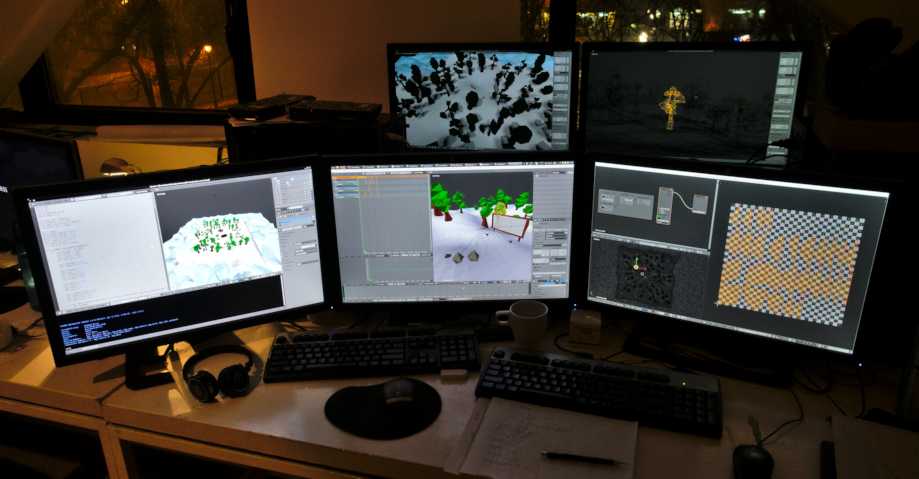Конфігурування периферійних пристроїв – Configuring Peripherals¶
Показ – Displays¶
A full HD display or higher is recommended. Multi-monitor setups are supported, and workspaces can be configured to span multiple monitors.

Приклад підтримки Blender’ом кількох одночасно моніторів.¶
Пристрої Уводу – Input Devices¶
Blender підтримує різні типи пристроїв уводу:
Клавіатура (рекомендовано: клавіатура з цифровою частиною справа, Англійська розстава працює найкраще)
Миша (рекомендовано: миша з трьома кнопками та коліщам прокрутки)
Пристрій NDOF (відомий також як 3D Миша)
Графічний Планшет – Graphic Tablet
Примітка
If you are missing an input device such as a mouse or numpad you can change Blender’s keymap to emulate these devices. Settings to enable this can be found in the Input Preferences.
Mouse – Миша¶
Емуляція кнопок миші – Mouse Button Emulation¶
Якщо ви не маєте миші з 3 кнопками, то вам необхідно буде емулювати її, увімкнувши опцію в Уподобаннях – Preferences.
Таблиця нижче показує використовувані комбінації:
3-кнопкова Миша |
LMB |
MMB |
RMB |
|---|---|---|---|
2-кнопкова Миша |
LMB |
Alt-LMB |
RMB |
Keyboard – Клавіатура¶
Емуляція Цифроблоку – Numpad Emulation¶
If you do not have a numeric Numpad on the side of your keyboard, you may want to emulate one (uses the numbers at the top of the keyboard instead, however, removes quick access to layer visibility).
Дивись також
Читайте більше про Емуляцію Цифроблоку у секції про Уподобання – Preferences.
Клавіатура з Не-Англійською розставою – Non-English Keyboards¶
If you use a keyboard with a non-English keyboard layout, you still may benefit from switching your computer to the UK or US layout as long as you work with Blender.
Примітка
You can also change the default keymap and default hotkeys from the Preferences, however, this manual assumes you are using the default keymap.
Графічний Планшет – Graphic Tablet¶
Graphics tablets can be used to provide a more traditional method of controlling the mouse cursor using a pen. This can help provide a more familiar experience for artists who are used to painting and drawing with similar tools, as well as provide additional controls such as pressure sensitivity.
Примітка
If you are using a graphic tablet instead of a mouse and pressure sensitivity does not work properly, try to place the mouse pointer in the Blender window and then unplug/replug your graphic tablet. This might help.
3D Маніпулятор (3D Миша) – NDOF (3D Mouse)¶
3D mice or NDOF devices are hardware that you can use to navigate a scene in Blender. Currently only devices made by 3Dconnexion are supported. These devices allow you to explore a scene, as well as making Fly/Walk Navigation easier to control. The NDOF device can be configured in the Preference. These settings can also be accessed using the NDOFMenu button on the NDOF device to open a pop-up menu to adjust the settings directly from the viewport.
Дивись також
Детальніше дивіться Input Preference щодо конфігурування периферій.
Head-Mounted Displays (Virtual Reality)¶
HMDs make it possible to place users in an interactive, virtual environment. Attached to the head, they track head movements to project a seemingly surrounding world onto small screens in front of the user’s eyes. If the system works well, they experience the virtual environment as if they were really inside of it.
Supported Platforms¶
Virtual reality support in Blender is implemented through the multi-platform OpenXR standard. This standard is new and therefore support for it is still limited.
Platform |
Operating System |
Notes – Примітки |
|---|---|---|
GNU/Linux |
Not recommended for general use yet. |
|
Oculus (Rift and Quest) |
Windows |
Prototype Release, Oculus Link required for Quest. |
Windows, GNU/Linux |
||
Windows |
Requires Windows 10 May 2019 Update (1903). |
Getting Started – Почин¶
The following subsections describe how an HMD can be set up for usage with the supported platforms. If this is not done, Blender will report an error when trying to start a virtual reality session.
Oculus¶
Oculus provides prototype OpenXR support. To use it, Blender has to be started in a special way, as described below.
Download and install the Oculus Rift software.
Start Blender by double clicking the
blender_oculusscript inside the installation directory. It will open a command-line window with further information.Enable the VR Scene Inspection add-on in Blender.
SteamVR¶
OpenXR support in SteamVR is a developer preview. It requires SteamVR beta features.
Launch SteamVR. It should show a prompt for making SteamVR the default OpenXR runtime. Click
Set as default.Enable the VR Scene Inspection add-on in Blender.
Windows Mixed Reality¶
To check if a PC meets the requirements to run Windows Mixed Reality, Microsoft offers the Windows Mixed Reality PC Check application.
Make sure the Windows 10 May 2019 Update (1903) is installed.
If the system meets all requirements, the Mixed Reality Portal should already be installed. It is also available in the Microsoft Store.
Launch the Mixed Reality Portal. Click the menu button
...in the lower left corner. In the menu it opens, select the Set up OpenXR.Enable the VR Scene Inspection add-on in Blender.
For more information, refer to Windows“ Getting Started Guide for OpenXR.
Monado¶
Monado is a free and open source XR platform for Linux. It is not yet ready for production usage and should only be used for testing purposes.
Packages are available for the following distributions:
Ubuntu (Eoan, Focal)
For other systems, it has to be compiled from source, which in this case is not recommended for people with little experience in compiling software. Follow the Getting Started Guides from Monado to do so nevertheless.